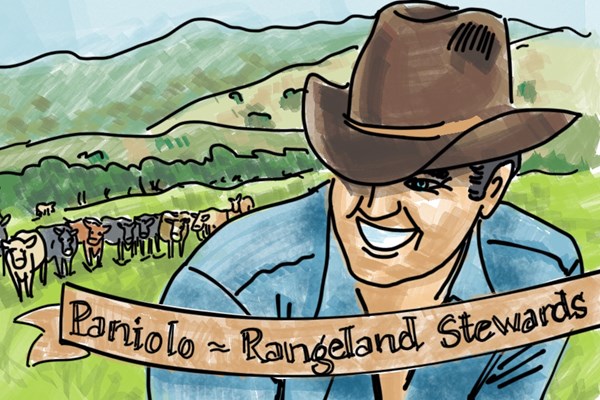Resources and good management keep the boots on the ground
Oct 09, 2020

Our talk story series continues with farmers, ranchers, and stakeholders in the local agriculture industry to explore the crucial role of ag producers in sustaining our communities during the COVID-19 pandemic.
A conversation with
Jimmy Greenwell, president of Hawaii Rangeland Stewardship Foundation
By Dani Douglass
When Jimmy Greenwell stands on rangeland in Hawaii, which makes up 20 percent of the state’s land, he doesn’t simply see the breathtaking beauty that surrounds him. Greenwell, president of the Hawaii Rangeland Stewardship Foundation (HRSF), sees a suite of ecosystem services flowing from natural resources.
Greenwell said that the best management systems are rooted in education and bring science and resources together. That is why the HRSF, which started in 2014 and has offered its services for the past several years, was created.
“These services include watershed and habitat enhancement, soil conversation, wildfire mitigation, invasive species control, carbon sequestration, preservation of open spaces, vistas and cultural values,” Greenwell said. “The better these rangelands are managed, the greater their ecosystem benefits.”
Greenwell, who worked for 32 years for Palani Ranch Company and still sits on its board today, was there from the beginning stages of HRSF. He remains committed to its mission to better stewardship practices through programs that synergize science, technology and expertise.
“There is an important linkage between the resources, the foundation, the industry and the community … and each has value to the other,” he said.
The organization provides support for grazing and rangeland stakeholders – including the Hawaii Cattlemen’s Council and its partners – through workshops, research and outreach programs. The organization also offers the community opportunities to get involved in stewardship that honor Hawaii’s lands through fundraising events and direct solicitations.
“We help those out there who are managing the cows, the land and the resources to be on top of their game,” Greenwell said. “We raise funds to bring technology and natural practices to them as well as educate the general public to what we are doing. We believe that encouraging and involving the community in our efforts significantly enhances the probability that perpetuating this key natural resource element in Hawaii’s landscape.”
The pandemic has brought the familiar pivots to HRSF’s fundraising efforts. Its workshops have moved to a virtual format and staff is focusing more on long-term development strategies. The team has used this time as an opportunity to create additional educational materials that will help it to better tell its story as the organization is introduced to potential supporters.
A new annual student scholarship is one of the resources HRSF is offering to encourage students to go into the field. Greenwell said that application information will be available online soon and that information on other resources, such as workshops, can also be found on the website.
Education and awareness are essential components of the HRSF as it works to connect the community and ensures the health and livelihood of future generations. Of all the lessons this year has brought to the spotlight, connectivity remains at the core.
“Our community’s ecological well-being is closely tied to its success in managing, supporting and sustaining its agricultural land base and those that have been boots on the ground as its stewards for generations,” Greenwell said. “We are indeed all in this together.”
In thinking about the sustained health and livelihood of Hawaii’s rangelands, Greenwell has two requests of the community. The first thing residents can do, if they are able, is to consider directly supporting the HRSF or participating in sponsorship opportunities, such as the Rangeland Open Golf Tournament in May 2021. The second has to do with shifting perspective about rangelands.
“If you already know the benefits, share that information,” he said. “If you always thought cattle ranching was bad, take a fresh look and learn about what rangeland stewards really do.”
Categories
- Clean Transportation (103)
- Renewable Energy (65)
- Agriculture Story Series (20)
- Local Food (111)
- News Releases (19)
- Promotions and New Hires (4)
- Less Waste (8)
- Freshwater (16)
- Our Ohana (15)
- In the News (5)
- careers (1)
- Blog (1)
- clean energy (2)
- PUC (1)
- Ulupono Video Podcast Series Talk Story Room (1)
- Bills (1)
- Legislature (1)
- DA BUX (1)
- Electric Vehicle (1)

